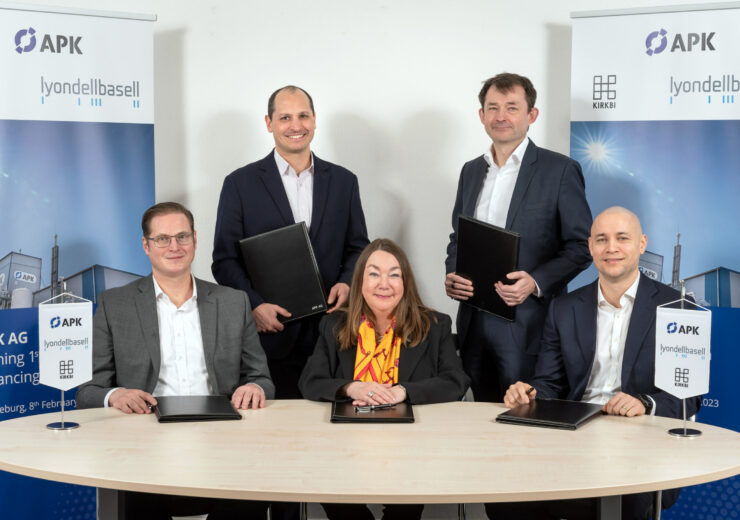The investment is intended to develop new solvent-based recycling technology for low-density polyethylene and build new plants to increase the production capacity

LyondellBasell, APK and KIRKBI officials at the agreement signing ceremony. (Credit: APK AG/Tom Schulze)
Dutch chemical firm LyondellBasell and KIRKBI, a holding and investment company, together with other co-investors are set to invest around €130m in recycling technology company APK.
Germany-based APK seeks to increase the recycling of multi-layer flexible packaging materials and is known for its unique solvent-based recycling technology for low-density polyethylene (LDPE).
The solvent-based Newcycling process separates the various polymers of multi-layer packaging materials and generates recycled materials with a high level of purity suitable for new packaging materials.
As per the terms of the agreement, LyondellBasell and KIRKBI will become minority shareholders in APK. The funds will be used to construct Newcyling Plants to increase the production capacity.
KIRKBI Circular Plastics Investment head Damir Hamzic said: “We are happy to announce our investment in APK. KIRKBI believes APK offers a promising scalable technology in LDPE recycling that can help increase the circularity of plastics and minimise plastic waste, to contribute to a more sustainable environment in the future.
“We look forward to providing strategic, financial and commercial support while APK establishes technology that will compliment mechanical and chemical recycling.”
APK is developing Newcycling brand to reduce CO2 emissions and safeguard raw materials for future generations.
The firm is running a pilot plant in Merseburg, Germany, where this technology has already been industrialised.
APK AG’s subsidiary APK Newcycling Competence Centre (APK NCC) has also been running a technological centre in the Frankfurt Hoechst location since June 2022.
APK NCC managing director Susanne Küppers said: “Our Newcycling technology makes it possible to close the loop even with complex waste streams and to produce high-quality LDPE recyclates from mixed plastic waste – highly efficient and offering both economic and ecological advantages.
“We have been proving for years that this is also possible on an industrial scale at our plant in Merseburg.”
